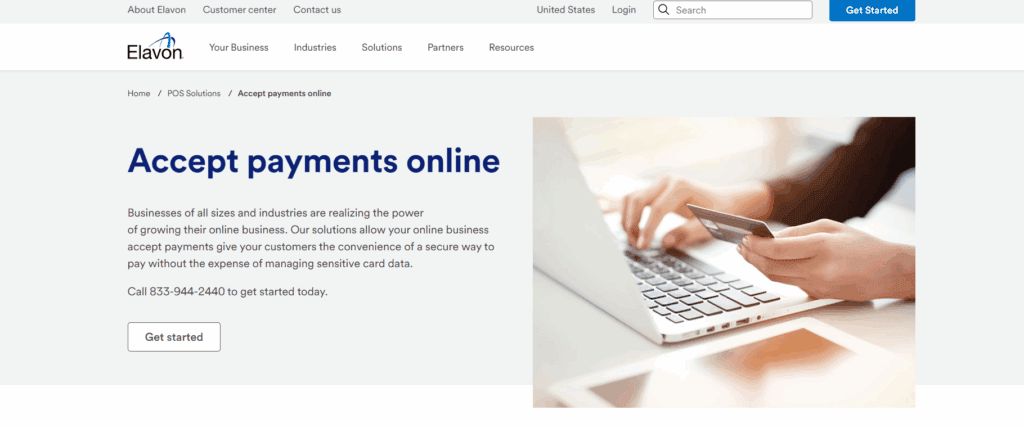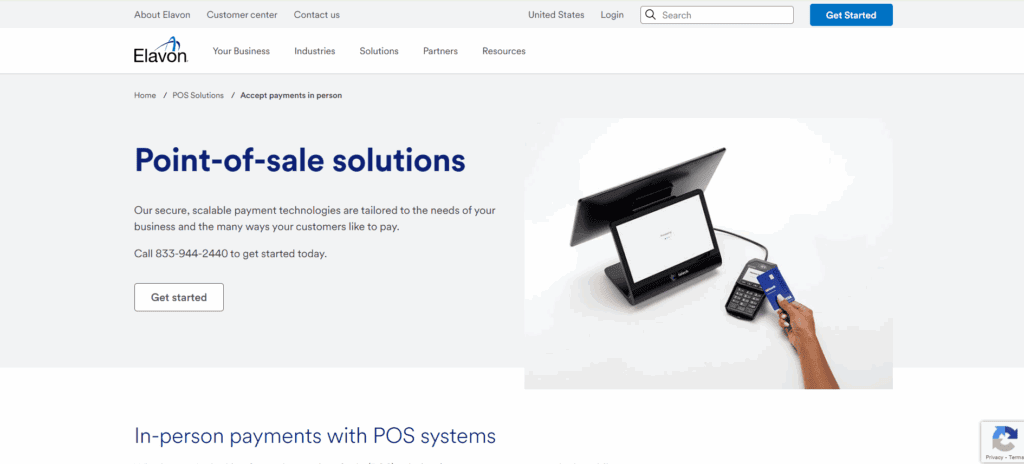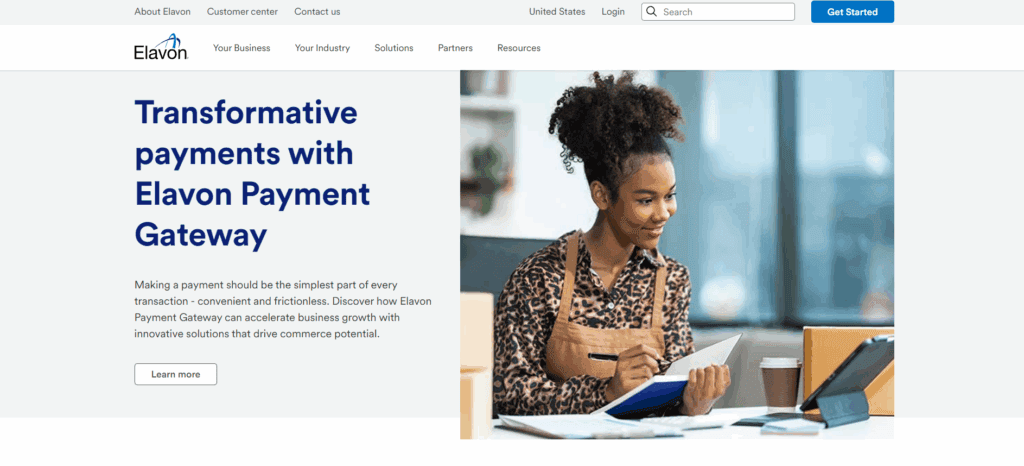Elavon Payment Processing: A Comprehensive Review

Elavon is a longstanding global payment processor with over 30 years of experience serving businesses of all sizes. As a wholly owned subsidiary of U.S. Bank, it provides merchant services with the backing of a major financial institution. Elavon supports more than one million customers globally and offers solutions that span in-store, online, and mobile transactions. Lets read more about Elavon Payment Processing.
Elavon serves merchants in over ten countries from its headquarters in Atlanta, Georgia. It collaborates with a wide range of sectors, such as healthcare, education, retail, and hospitality. Since Elavon serves as both an acquirer and a payment processor, vertical integration is one of its key advantages. By handling everything through a single provider, this enables businesses to optimize their operations.
The quality of the service and the onboarding process, however, can differ, particularly for merchants who sign up through third-party resellers. Despite Elavon’s reputation for dependability and scalability, some small businesses have voiced concerns about the company’s complicated contract terms and unclear pricing. Although the platform is perfect for businesses looking for reliable infrastructure, careful consideration is necessary before committing to it in the long run.
Supported Payment Methods and Hardware | Elavon Payment Processing
Elavon supports a wide range of payment types, making it a flexible option for businesses that serve customers through multiple channels. Merchants can accept all major credit and debit cards, including Visa, Mastercard, American Express, and Discover. In addition, Elavon processes ACH payments and digital wallet transactions such as Apple Pay and Google Pay. EMV chip and contactless transactions are also supported.
The company provides a variety of hardware options tailored to different industries. These include traditional countertop terminals, mobile card readers, and POS devices for tableside service. Elavon partners with well-known hardware providers like Ingenico and Poynt to offer dependable and secure devices.
For more advanced needs, it offers integrated POS systems that handle inventory tracking, customer engagement, and tipping. The company’s proprietary talech POS system is designed specifically for small and mid-sized businesses and supports cloud-based management. While the selection is broad, the range of choices may overwhelm some merchants, particularly those without technical support. Working with an Elavon representative can help identify the right setup.
Online and eCommerce Capabilities
Elavon offers a complete suite of online payment tools suitable for both small web stores and enterprise-level eCommerce operations. The company’s Converge gateway enables merchants to accept credit cards, digital wallets, and recurring billing through a secure platform. It integrates with popular platforms like Shopify, Magento, WooCommerce, and BigCommerce.
It provides hosted payment pages and virtual terminals for companies without full websites. For remote service providers, these tools are perfect because they let merchants send payment requests by text or email. Recurring billing features are also supported for subscription models. One of the main priorities of Elavon’s online products is security. Tokenization and encryption protect sensitive data, and the platform is fully PCI compliant. Verification checks and transaction monitoring are two fraud prevention tools that help lower chargebacks and suspicious activity.
Elavon’s eCommerce tools might not be as easy to use as those from more recent, technologically advanced providers, despite their robust features. To set up integrations, businesses with little internal technical expertise might need outside assistance. For those willing to invest time in customization, the platform delivers strong performance and control.
Mobile and Contactless Payments
Elavon provides reliable mobile payment solutions that meet the demands of modern, on-the-go businesses. Its mobile POS systems include compact card readers that connect to smartphones or tablets via Bluetooth. These readers accept contactless, EMV chip, and magnetic stripe payments, offering flexibility in field operations.
Paired with Elavon’s mobile app, merchants can process transactions, issue digital receipts, and monitor sales in real-time. This is especially useful for vendors at events, food trucks, or service providers visiting clients. All Elavon devices support tap-to-pay transactions, accommodating customer preferences for contactless options like Apple Pay and Google Pay. This enhances checkout speed and hygiene, both of which have become more important post-pandemic.
Enterprise clients can also integrate mobile solutions into their broader systems with centralized reporting tools. While Elavon’s mobile tools are secure and functional, they may not match the sleek user experience or interface design of fintech-first platforms. Businesses new to mobile POS might experience a slight learning curve.
Integration with Business Tools
Elavon excels in integrating payment services with other essential business tools. The platform offers compatibility with accounting software, inventory management systems, and CRM tools.
The integration with QuickBooks, which enables smooth transaction reconciliation and lowers manual errors, is one of its best features. Additionally, Elavon’s Converge platform offers API access, allowing companies to develop unique integrations for their in-house software or third-party platforms such as NetSuite and Salesforce.
Inventory management, staff management, and sales tracking are all integrated into the Talech POS system. For small retailers or hospitality companies wishing to centralize operations, this one-stop solution is especially beneficial. Despite their strength, the integration options might not be as intuitive as plug-and-play systems from more recent suppliers. Smaller businesses might require assistance during setup, but companies with IT support will gain the most from Elavon’s integration capabilities.
Security Features and PCI Compliance
Elavon places a strong emphasis on payment security. Its systems use P2PE and tokenization to protect sensitive information during and after transactions. These technologies reduce the risk of data breaches and help merchants meet compliance requirements. The company offers robust support for PCI DSS compliance, including online tools, compliance checklists, and assistance with Self-Assessment Questionnaires. Merchants using Elavon’s certified equipment often find the compliance process more straightforward.
To address fraud risks, Elavon provides tools such as AVS, CVV code matching, and real-time risk monitoring. These are especially useful for businesses with online or mail-order transactions. It also offers a Breach Protection Program for qualifying merchants, which covers some costs associated with a data breach, such as fines and forensic audits. However, understanding the fine print of Elavon’s security programs may require extra effort. Merchants should take time to fully understand what protections are in place and what responsibilities they hold.
Reporting and Analytics Dashboard
A reporting dashboard on Elavon’s Converge platform offers up-to-date information on payment activity. In addition to tracking transaction volumes and payment trends, merchants can view daily sales. Reports can be exported for use in accounting systems after being customized by date, payment method, and location.
Analytics that monitor customer behavior, inventory turnover, and employee performance are also included in the Talech POS. Businesses can use these insights to spot sales trends and make wise choices. Reviewing performance data from any location is made simple by the reporting tools’ compatibility with desktop and mobile devices. To inform merchants of unusual activity or settlement problems, alerts can be configured.
While the reporting features are effective, they may not offer the same depth or visual polish as dedicated business intelligence platforms. Larger enterprises may still prefer to export data into tools like Power BI or Tableau for more advanced analysis.
Pricing Structure and Contracts
Elavon uses multiple pricing models, including interchange-plus, tiered, and flat-rate plans. However, pricing specifics are not always publicly disclosed and often depend on a sales consultation or third-party reseller agreement.
Merchants may encounter monthly account fees, gateway fees, PCI compliance charges, and early termination penalties. These can add up quickly if not clarified during onboarding. Pricing transparency can vary depending on whether the merchant signs up directly or through an ISO. Elavon typically requires a three-year contract with automatic renewal clauses. Businesses that exit early may face cancellation fees, which can be a deterrent for smaller operations seeking flexibility.
To avoid surprises, businesses should ask for a complete breakdown of fees and terms in writing. Higher-volume merchants may be able to negotiate better rates. Smaller companies, however, should carefully compare Elavon’s pricing with alternatives before committing.
Customer Support and Service Quality
Elavon offers customer service by phone, email, and an online help center around-the-clock. Businesses that operate outside of regular business hours will benefit from this 24/7 availability. For qualified merchants, the business also provides account management and onboarding support.
Users of Talech POS have access to an additional support channel, which could speed up the resolution of issues. Comprehensive documentation on terminal setup, compliance, and integration can be found on Elavon’s website. Nevertheless, client experiences can differ, especially when independent agents are used to set up accounts. Inconsistent support quality and delays during urgent issues are reported by certain merchants.
Companies that need high-touch assistance should find out if a dedicated account manager will be on hand. Additionally, Elavon is multilingual, which is advantageous for companies catering to a wide range of clientele.
Pros and Cons Summary
Elavon offers a robust range of payment processing solutions supported by U.S. Bank’s sound financial standing. It is ideal for companies that require enterprise-grade security, advanced integration, and in-store, online, and mobile capabilities.
Its dependence on third-party resellers, pricing opacity, and long-term contracts, however, may be disadvantages. Compared to more recent providers with simpler models, smaller businesses might find the setup procedure or cost structure less alluring. Businesses that can fully utilize Elavon’s features and are at ease handling more complicated pricing and integration requirements are the ideal candidates.
FAQs
Q1: Is Elavon good for small businesses?
A: Elavon can support small businesses, but they should review contract terms and ensure the pricing model fits their needs and resources.
Q2: Can Elavon be used with existing POS hardware?
A: Yes, Elavon supports many third-party POS devices, though compatibility should be confirmed before signing up.
Q3: Does Elavon support recurring billing?
A: Yes, recurring billing is available through Elavon’s Converge platform, making it suitable for subscription services and memberships.








